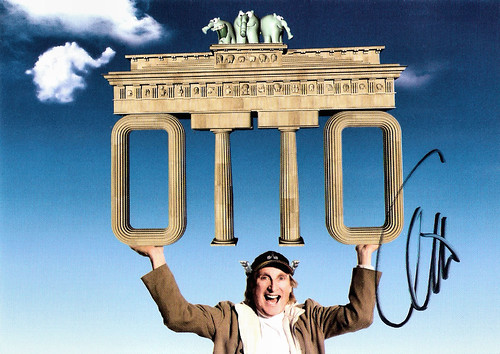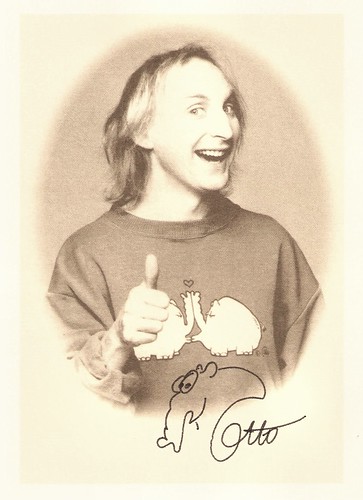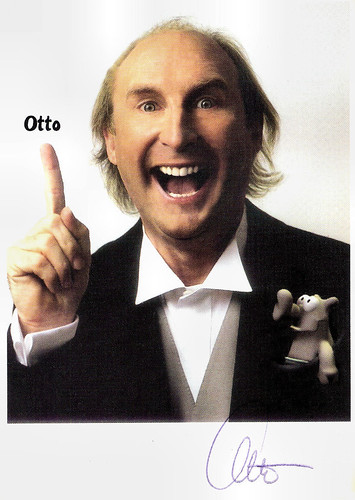Frisian comedian and actor Otto Waalkes (1948) became famous in the 1970s and 1980s in Germany with his shows, books and films. Many of his sketches have become classics in Germany, and several of his phrases and jokes have become public catchphrases. His perhaps most famous trademark are the Ottifanten (Ottiphants), elephant-like comic characters of his own design.

German promotion card by Rüssl Räckords, Hamburg / Edel. Promotion card for the DVD Otto - Das Orginal.
Otto Gerhard Waalkes, often simply called Otto, was born in 1948 in Emden, Germany. He was the second son of the master painter Karl Waalkes and his wife Adele, born Lüpkes. Otto got his first guitar when he was 12, and during his high school years, he played in a rock & roll band called the Rustlers, who gave their first public performance in 1964.
In 1970 he attended the Academy of Fine Arts Hamburg, living in a huge apartment-sharing community that counted 14 other residents, among them Udo Lindenberg and Marius Müller-Westernhagen. During his performances with The Rustlers, Waalkes' stage banter and the introductions to his songs proved to be far more popular than the music itself, so before long Waalkes put together a solo program that focused on comedy.
He designed the Ottifanten (Ottiphants), elephant-like comic characters, which would become his most famous trademark. The Ottifanten featured on the cover of his first album, Otto (1973). In the course of his career, he released more than ten comedy albums in Germany, most of them going platinum with more than 500,000 copies sold.
A 1973 TV show called Otto Show was Waalkes' breakthrough. Christian Genzel at AllMusic: “Waalkes' persona is essentially a child in a man's body; his jokes are often intentionally juvenile and silly, often building on numerous puns (in the tradition of his idol, German comedian Heinz Erhardt) and spinning absurd situations into even more absurd territory.”
After a series of popular stand-up live programs on television, Waalkes was ready for the big screen. His first film was the romantic comedy Otto - Der Film (Xaver Schwarzenberger, Otto Waalkes, 1985) bulking of slapstick, verbal jokes, absurdities, satirical side gags and visual ideas. It won the Golden Screen and also a Bambi award and became the most successful German film of all time with 14 million viewers.
Unfortunately, most of Otto's later films were not really up to the standard he set with his first film. These included Otto - Der Neue Film/Otto, the new film (Xaver Schwarzenberger, Otto Waalkes, 1987), Otto - Der Außerfriesische/Otto, The Extra Frisian (Marijan Vajda, Otto Waalkes, 1989) and Otto - Der Liebesfilm/Otto, the love film (Bernd Eilert, Otto Waalkes, 1992). In the 1990s followed several years of little media attention.

German promotion card by Rüssl Musikverlag, Hamburg.

German promotion card by Rüssl Musikverlag, Hamburg / Polydor.
In the new century Otto Waalkes successfully returned to the cinema with 7 Zwerge/7 Dwarfs (Sven Unterwaldt, 2004), a hilarious parody on Snow White & the Seven Dwarfs with Punkrock-Icon Nina Hagen as the evil queen and her daughter Cosma Shiva Hagen as Snow White. The dwarfs were played by several popular, younger comedians.
The experiment worked and the film drew almost seven million viewers in German cinemas. It re-established Waalkes' popularity with an older and newer generation of fans. The sequel 7 Zwerge - Der Wald ist nicht genug/7 Dwarves: The Forest Is Not Enough (Sven Unterwaldt, 2006) was another box-office hit.
Waalkes also worked as a voice actor, providing the German voices of Mushu in Disney's Mulan (Tony Bancroft, Barry Cook, 1998) and Sid the Sloth in Ice Age (Chris Wedge, Carlos Saldanha, 2002) and its sequels. His recent films include Otto's Eleven (Sven Unterwaldt, 2010) with Mirco Nontschew, and the family film Hilfe, ich hab meine Lehrerin geschrumpft/Help, I Shrunk My Teacher (Sven Unterwaldt, 2015), in which Waalkes had a supporting part.
Otto Waalkes was married twice. From 1987 till 1999, he was married to Manuela Ebelt, with whom he has a son, Benjamin Waalkes. His second wife, from 2000 till 2012, was actress Eva Hassmann, who co-starred with him in Otto – Der Katastrofenfilm. He shares a close friendship with tennis player Steffi Graf, who also appeared as herself in the film Otto – Der Außerfriesische.
Otto Waalkes continues to be a popular and respected figure in Germany's comedy scene.
Trailer Otto - Der Film (1985). Source: RialtoFilm (YouTube).
Trailer Otto's Eleven (2010). Source: Nichts mehr verpassen! (YouTube).
Sources: Christian Genzel (AllMusic), Wikipedia (German and English), and IMDb.

German promotion card by Rüssl Räckords, Hamburg / Edel. Promotion card for the DVD Otto - Das Orginal.
Ottiphants
Otto Gerhard Waalkes, often simply called Otto, was born in 1948 in Emden, Germany. He was the second son of the master painter Karl Waalkes and his wife Adele, born Lüpkes. Otto got his first guitar when he was 12, and during his high school years, he played in a rock & roll band called the Rustlers, who gave their first public performance in 1964.
In 1970 he attended the Academy of Fine Arts Hamburg, living in a huge apartment-sharing community that counted 14 other residents, among them Udo Lindenberg and Marius Müller-Westernhagen. During his performances with The Rustlers, Waalkes' stage banter and the introductions to his songs proved to be far more popular than the music itself, so before long Waalkes put together a solo program that focused on comedy.
He designed the Ottifanten (Ottiphants), elephant-like comic characters, which would become his most famous trademark. The Ottifanten featured on the cover of his first album, Otto (1973). In the course of his career, he released more than ten comedy albums in Germany, most of them going platinum with more than 500,000 copies sold.
A 1973 TV show called Otto Show was Waalkes' breakthrough. Christian Genzel at AllMusic: “Waalkes' persona is essentially a child in a man's body; his jokes are often intentionally juvenile and silly, often building on numerous puns (in the tradition of his idol, German comedian Heinz Erhardt) and spinning absurd situations into even more absurd territory.”
After a series of popular stand-up live programs on television, Waalkes was ready for the big screen. His first film was the romantic comedy Otto - Der Film (Xaver Schwarzenberger, Otto Waalkes, 1985) bulking of slapstick, verbal jokes, absurdities, satirical side gags and visual ideas. It won the Golden Screen and also a Bambi award and became the most successful German film of all time with 14 million viewers.
Unfortunately, most of Otto's later films were not really up to the standard he set with his first film. These included Otto - Der Neue Film/Otto, the new film (Xaver Schwarzenberger, Otto Waalkes, 1987), Otto - Der Außerfriesische/Otto, The Extra Frisian (Marijan Vajda, Otto Waalkes, 1989) and Otto - Der Liebesfilm/Otto, the love film (Bernd Eilert, Otto Waalkes, 1992). In the 1990s followed several years of little media attention.

German promotion card by Rüssl Musikverlag, Hamburg.

German promotion card by Rüssl Musikverlag, Hamburg / Polydor.
The experiment worked
In the new century Otto Waalkes successfully returned to the cinema with 7 Zwerge/7 Dwarfs (Sven Unterwaldt, 2004), a hilarious parody on Snow White & the Seven Dwarfs with Punkrock-Icon Nina Hagen as the evil queen and her daughter Cosma Shiva Hagen as Snow White. The dwarfs were played by several popular, younger comedians.
The experiment worked and the film drew almost seven million viewers in German cinemas. It re-established Waalkes' popularity with an older and newer generation of fans. The sequel 7 Zwerge - Der Wald ist nicht genug/7 Dwarves: The Forest Is Not Enough (Sven Unterwaldt, 2006) was another box-office hit.
Waalkes also worked as a voice actor, providing the German voices of Mushu in Disney's Mulan (Tony Bancroft, Barry Cook, 1998) and Sid the Sloth in Ice Age (Chris Wedge, Carlos Saldanha, 2002) and its sequels. His recent films include Otto's Eleven (Sven Unterwaldt, 2010) with Mirco Nontschew, and the family film Hilfe, ich hab meine Lehrerin geschrumpft/Help, I Shrunk My Teacher (Sven Unterwaldt, 2015), in which Waalkes had a supporting part.
Otto Waalkes was married twice. From 1987 till 1999, he was married to Manuela Ebelt, with whom he has a son, Benjamin Waalkes. His second wife, from 2000 till 2012, was actress Eva Hassmann, who co-starred with him in Otto – Der Katastrofenfilm. He shares a close friendship with tennis player Steffi Graf, who also appeared as herself in the film Otto – Der Außerfriesische.
Otto Waalkes continues to be a popular and respected figure in Germany's comedy scene.
Trailer Otto - Der Film (1985). Source: RialtoFilm (YouTube).
Trailer Otto's Eleven (2010). Source: Nichts mehr verpassen! (YouTube).
Sources: Christian Genzel (AllMusic), Wikipedia (German and English), and IMDb.
No comments:
Post a Comment